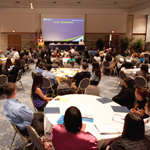Thomas Jefferson University Hospital in Philadelphia is planning to deploy interactive speakers in hospital rooms so that patients can obtain basic information through voice commands, and make requests to customize their hospital setting.
The so-called “cognitive hospital rooms” will be powered by IBM Watson Internet of Things (IoT) and available at three Jefferson facilities overseeing more than 900 acute care beds, where the technology is expected to offer myriad benefits on both ends of the care spectrum.
“Being in a hospital can often be a hectic, anxiety-ridden, or even intimidating experience for patients and their loved ones. If we can minimize that discomfort, even a little, we are doing a lot to increase the well-being and care of our patients,” said Neil Gomes, vice president for Technology Innovation and Consumer Experience at Thomas Jefferson University and Jefferson Health, in a statement.
Gomes credits the undertaking to Dr. Stephen Klasko, the president and CEO of Thomas Jefferson University Hospitals, and his visionary approach to innovation. With Watson, the patients will be able to take control over their hospital stay and the overall experience — operating lights, window blinds, asking questions about hospital facilities or even getting background information on their physician.
In addition to putting more control into the hands of patients, IBM Watson and the hospital are hoping the cognitive rooms will also decrease some of the burden on providers. According to The Physician’s Foundation, 81 percent of physicians describe themselves as either over-extended or at full capacity, while only 19 percent indicate they have time to see more patients.
In September, a study by the American Medical Association (AMA) and Dartmouth-Hitchcock health care system found that approximately half of a physician’s day may consist of punching data into an EHR and performing other administrative desk tasks.
The in-room speakers will be connected to the IBM Watson IoT Platform that taps into the system’s well-known cognitive computing and natural language capabilities. It also has the ability to access hospital data that is relevant and important for patients and the types of questions they typically may have about their hospital stay.
Hypothetically, a patient might ask Watson about scheduling visits from loved ones, getting details about their doctor’s background and credentials and initiating changes to the room’s lighting or temperature. A patient in a cognitive room could also schedule reminders with Watson, or ask for certain types of music or entertainment.























